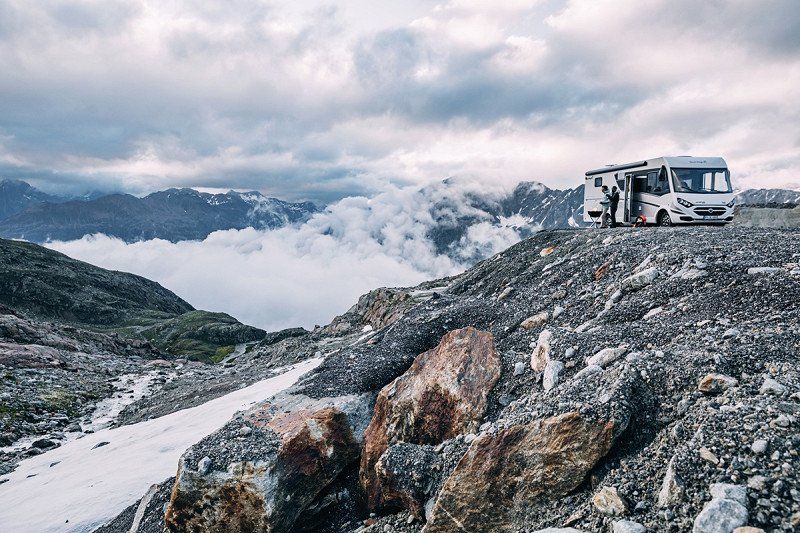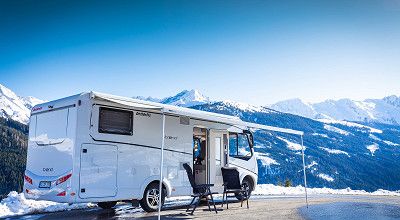Many campers take their motorhomes or caravans off the road in winter and park them in a dry and safe place for winter storage. However, the number of motorhome owners who continue caravanning in winter has been growing steadily. Winter camping can present special challenges, especially if you are new to this adventure. Freeontour has put together a practical guide with tips from seasoned winter campers so that beginners can enjoy their winter holiday in their mobile home from day one.
1. Make your vehicle winter-proof
A winter holiday puts even greater demands on recreational vehicles, no matter whether it's a motorhome or a car/caravan combination. Therefore, you should thoroughly check your motorhome or caravan – including the towing vehicle – before you head off on holiday and get it ready for winter. The winter checklist is similar for motorhomes as for cars: add antifreeze to your windscreen wiper fluid, ensure the engine oil can be used in winter and check whether the engine coolant has enough antifreeze as well.
Do not forget to examine how well the wiper blades perform and replace them with new ones if necessary. If you have a full spare canister in your vehicle, make sure it contains winter and not summer diesel, otherwise fill it up with winter diesel just in case.
2. Fit & check your winter tyres
All vehicle owners have to ensure they use the correct tyres at this time of year. Not only is it vital to comply with the national regulations in your home country, but also with those in the countries you are travelling to and through. If you were on the road in summer with summer tyres on your camper, then do not forget to change the tyres in due time and to make sure that the tread depth of your winter tyres is at least 4 mm.
3. Pack a winter kit
To make sure you are prepared for all eventualities, we recommend taking snow chains. They can be extremely useful not only in heavy snowfall, but also if your mobile home or car/caravan combination gets stuck in the mud, e.g. in the campsite after heavy rain. It is also worth buying shims for this very situation as they are designed to help your motorhome regain traction on slippery surfaces. These kinds of plates can also prevent caravan supports or motorhome jacks from sinking when it starts to thaw.
As with all cars, a winter kit should include ice scrapers, hand brushes and gloves. Jump leads, tow ropes and wheel chocks could also come in handy. Moreover, a shovel is also a practical tool to have on board if you are travelling to a country with a high probability of snow.
4. Check batteries, gas & heating
It can become very unpleasant in your mobile home if something stops working, especially when caravanning in winter. Before setting off, check the charge status of all vehicle batteries and make sure that all batteries are fully charged as the darker days and longer nights put higher demands on lighting than in summer. Equip your camper with a few LED candles for emergencies and a cosy atmosphere. Moreover, check the function of all indoor and outdoor light sources. Carry out a test run of the heating and hot water system to rule out any malfunctions.
And do not forget to check how full the gas bottle(s) is and top up if necessary as a motorhome or caravan uses significantly more gas in winter than in summer. Level measurement tools are available in accessory stores in different price ranges. If you have a two-bottle system, an automatic switch valve can also increase comfort and convenience.
5. Inspect and maintain seals
Leaky or porous rubber seals on doors, windows or skylights can quickly lead to troublesome consequences in winter. Therefore, remove dirt from them with a damp microfibre cloth and check their condition before leaving for your winter holiday. If they look fine, treat them with a silicone care product, talc or classic deer tallow. This not only maintains the seals, but also helps prevent them from freezing up. However, if any seals do have some porous spots, we recommend replacing them. By the way: you should also protect the jacks from the effects of the weather and road salt by applying winter-proof grease.
6. Distribute the weight correctly
It is always essential to distribute the weight correctly when travelling by motorhome, campervan or car/caravan combination, regardless of the season. However, weight distribution can have an even greater impact on driving stability on slippery roads in winter, which is why luggage should be stowed more meticulously than usual at this time of year. The rule of thumb is: heavy loads at the bottom and, when it comes to caravans, as close to the axle as possible. On the other hand load both axles as evenly as possible in motorhomes. Here are some tips on how to distribute weight correctly in different vehicle types:
7. Choose a campsite or pitch suitable for your needs
When choosing a campsite or motorhome pitch for winter camping, personal needs and wishes also play a decisive role, just as they do in the other seasons. So for instance, if you are planning to use the campsite sanitary facilities, make sure that they are also heated. When combining winter camping with a skiing holiday, you need to know where you are going to store and dry your wet skiwear – if you have a large, heated rear garage, then you already have the solution, but otherwise ensure the campsite has a communal drying room.
The duration of the stay could also be important, especially for caravanners. If you intend to stay in one location for longer, make sure that the site can also exchange gas bottles. When the weather is playing up, families will greatly appreciate a heated common room or recreation room on site, preferably with free WiFi. And given the shorter days in winter, a power connection is vital for a longer stay. You can simply filter these and more features in our Freeontour campsite guide to find the right campsite or motorhome pitch for you.
8. Keep an eye on battery and gas bottle levels
It is vital to keep an eye on the charge level of the on-board battery and fill level of gas bottles in winter. A loose power cable can quickly result in the battery "running at idle" and becoming damaged. And a heating failure due to a gas bottle running out in the middle of the night can ruin your winter camping experience.
9. Heat and insulate your camper properly
Caravan or motorhome heating systems are usually large enough to produce plenty of heat to keep the vehicle nice and cosy even when camping in winter – provided you take some things into consideration. Since dry air is easier to heat than damp air, do not hang wet clothing inside your vehicle to dry. Moreover, tilt the window over the stove when cooking to avoid condensation forming. You can reduce thermal bridges, which mainly occur on the non-insulated windows in the driver's cab, by using thermal mats in front of or in the panes. Thermal curtains can even completely seal off the driver's cab from the living area, but then you will not be able to use the driver and front passenger seats as a seating area when stationary. If you do not have underfloor heating in your camper, you can prevent cold feet with electrically heated mats. Please note: after a heavy snowfall, sweep the snow off your caravan or motorhome roof to stop the heating vent stack getting clogged.
Electrically heated mats will also put an end to cold feet in the bathroom or dinette, while adhesive heating films or heating cables that work according to the same principle will protect non-insulated fresh and waste water tanks and their pipes from freezing should your caravan or motorhome not already be equipped with the appropriate winter fittings.
10. Protect water pipes and tanks from frost
When camping in winter, you have to pay particular attention to fresh and waste water tanks and their supply pipes. If these components are found in vehicles that have been declared winter-proof, then they are already insulated and heated when they leave the factory, so you should not have to worry about them. But if this is not the case, then campers whose tanks and water pipes are neither insulated nor heated can still retrofit or improvise, e.g. by using adhesive heating films or heating cables that protect them from freezing. Learn more in the following article:







